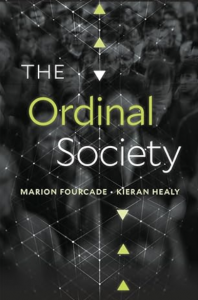This decision – again, entirely arbitrary and my own – was harder than ever this year because I left the long/shortlisting so late I had little time to mull it over. So I’m going to follow last year’s precedent and select two: The Unaccountability Machine by Dan Davies and The Ordinal Society by Marion Fourcade and Kieran Healy. Both speak to my own preoccupations – measurement and decision-making – but you don’t need to be as obsessed as me to derive a lot of interest and enjoyment from both books.
The prize is that I buy the winners lunch when we’re in the same location. I haven’t met Dan or Kieran before, but had the pleasure of meeting Marion when I visited Berkeley in the autumn. I hope to get back there to deliver the prize before too long. Dan I guess is London-based or close by and Kieran is at Duke, so please do both contact me to discuss delivery?
In case anyone is interested, here are previous winners.
Last year it was Ed Conway (Material World) and Paul Johnson (Follow the Money); in 2022 James Bessen for The New Goliaths and Brad Delong for Slouching Towrds Utopia (I saw Brad briefly in Berkeley too); in 2021 I picked Amartya Sen’s memoir A Home in the World; for 2020 it was William Quinn and John Turner with Boom or Bust. In 2019, the winner was Richard Davies with Extreme Economies.
Even earlier winners were:
2018 Kaushik Basu, The Republic Of Beliefs.
2017 Jean Tirole, Economics for the Common Good (I helped with the English translation so it got a closer read than usual!)
2016 Rebecca Spang, Stuff and Money in the Time of the French Revolution
2015 Josh Angrist and Steve Pischke for Mastering Metrics
2014 David Colander and Roland Kupers, Complexity and the Art of Public Policy
In 2013 it went to Jeremy Adelman for his biography of Albert Hirschman
And the very first in 2012 went to Ariel Rubinstein’s Economic Fables.
I think they’ve all stood the test of time. And here I am at lunch with Profs Angrist and Pischke, celebrating their receipt of this important award – the prize is real! (I took them to Delaunay.)




